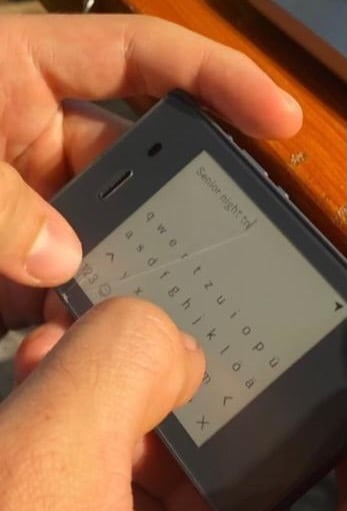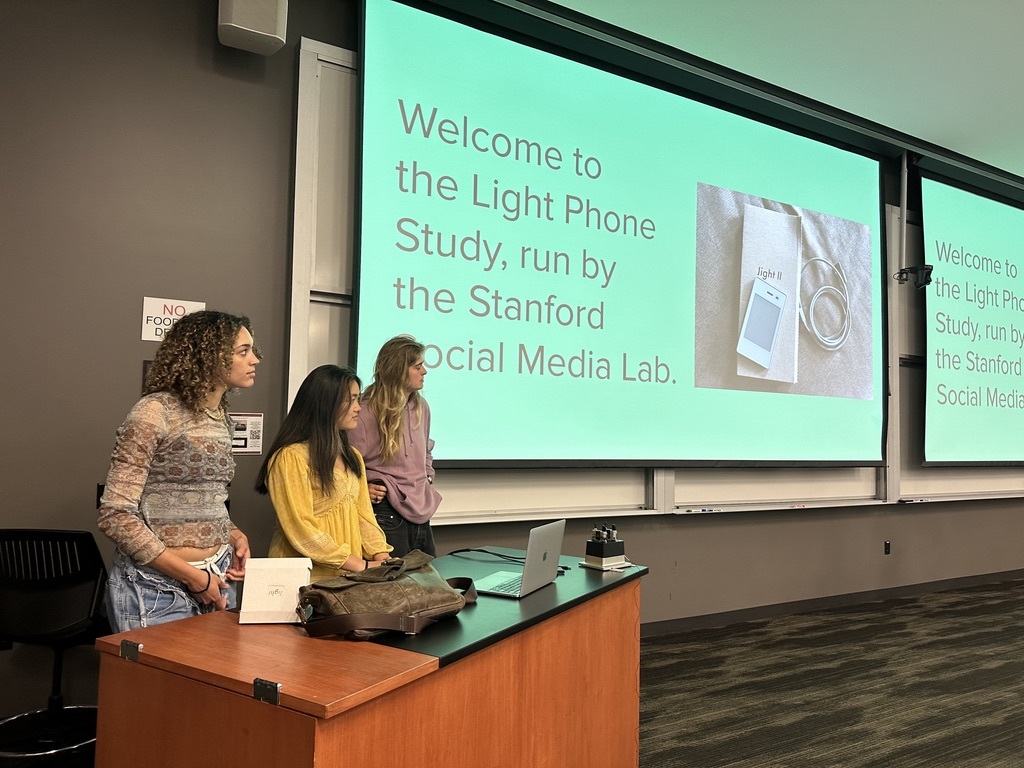The Stanford Social Media Lab wrapped up a study on the effect of smartphones and social media usage on mental health on May 12. The study asked participants to abandon normal smartphones for a week and switch to the Light Phone instead.
“Its slogan is: ‘a phone designed to be used as little as possible,’” said Georgia Walker-Keleher ’26, co-founder of the study and member of the research team.
Davey Agrawal ’26, a participant in the study, explained how the Light Phone eliminated the possibility of social media “taking over parts of your day when you don’t want it to.” For Agrawal, this was an immense positive. “I felt clear-minded throughout the week, and, I would say, it was easier to focus.”
The Light Phone by Light is equipped with a small, 96 by 55 millimeter e-ink display and runs the company’s specialized operating system “Light OS.”

“You can still take calls, you can still text people, you can set alarms, but there are no apps. There’s no social media,” said Angela Lee, a fifth-year Ph.D. student in communications who ran the study. The goal of the study was to “understand the effects of smartphone [and] social media use on psychological well being,” Lee said.
A full analysis of the study’s findings is still in the works, but anecdotal accounts like are overwhelmingly positive. “There were a lot of people who chose to keep the phone in the end,” Walker-Keleher said.
Agrawal and Jenna Ali ’25, both participants in the study, spoke highly of the Light Phone. They highlighted not only the mental health benefits of limiting access to social media, but also the time management and productivity it afforded.
Agrawal explained that while using the Light Phone, he would occasionally check Instagram on his iPad, “but each time I would have to do that, it’s very intentional.” Ali said that the use of a Light Phone allowed her to “really live in the moment.” “You don’t need to be on social media to have connections with people” she said.
Light was founded as a kickstarter in 2015, with the mission of “[being] an alternative to the tech monopolies that are fighting more and more aggressively for our time & attention,” according to Light’s website.
The idea for the study originally came from Walker-Keleher and her roommate Caroline Chen ’26, an editor at The Daily.
“In the spring of last year, I had been using the Light Phone for [a few months], and people would see it and be curious and ask about and want to try it,” Walker-Keleher said. She said that she reached out to several labs on campus and received interest from the Stanford Social Media lab.
Then she reached out to Joe Hollier, one of the founders of Light Phone. Walker-Keleher said she “asked him if he would be willing to donate phones or give phones for a Stanford study.”
She emphasized that the research results were independent to the industry partners.
Over 80 students took part in the research. After receiving their Light Phones and being helped through the setup process, participants agreed to completely switch over to the Light Phone for a week and fill out a series of surveys along the way.
Participants were split into three groups, a “high-interest group,” a test group and control group. The test and control group were recruited from classes in the communications department. “[Switching phones] requires a large incentive … we accomplished that by using it as a research credit for a [communications] class,” said Emma Charity ’25, a member of the research team.
The high-interest group was made up of participants who expressed interest in response to flyers and emails. This group was told, “If you want to, we will compensate you for your time if you’re willing to switch over from your smartphone,” Lee said. All three groups filled out the same set of surveys throughout the week.
Agrawal and Ali were overwhelmingly positive in their reviews of the light phone, but they also highlighted a few particular challenges. “I wish that it had Spotify so that I could stream music … Also, the directions could be a little better,” Ali said.
Agrawal highlighted the phone’s lack of support for WhatsApp. Light Phone wrote on its website that they hope to support WhatsApp in the future, but “don’t currently have plans or a timeline for that functionality.”
A complete analysis of the collected data is expected to release soon. “It’ll hopefully have a lot of implications for this ongoing debate about how smartphones and social media specifically affects mental health and wellbeing,” Lee said.
She noted that there is a scarcity of experimental studies in this field. “We know this is a big question that a lot of people have, and people have a lot of strong priors or beliefs about it,” she said.
Walker-Keleher said that group intends to re-run the study next fall.
“I hope that this [study] sparks people’s interest in how their technical talent and how their interest in tech issues can spur actual products and actual change,” Charity said.
A previous version of this article misspelled Agrawal’s last name. The Daily regrets this error.
